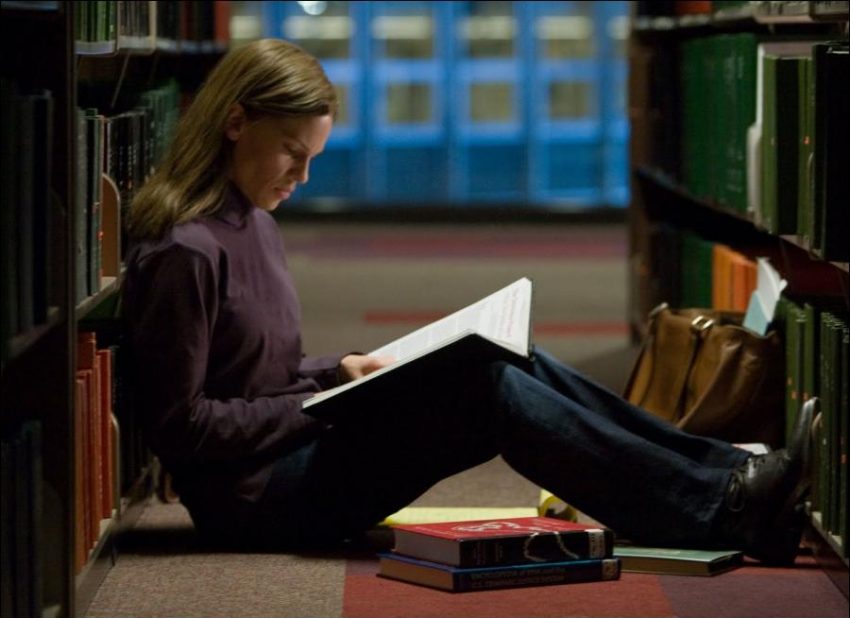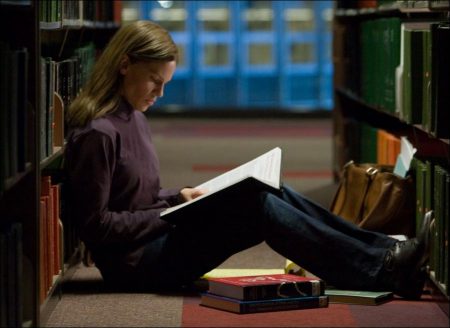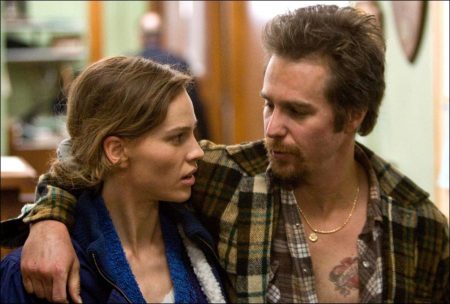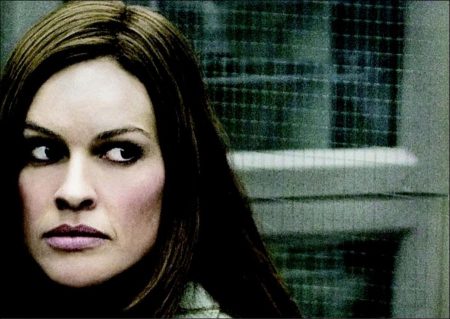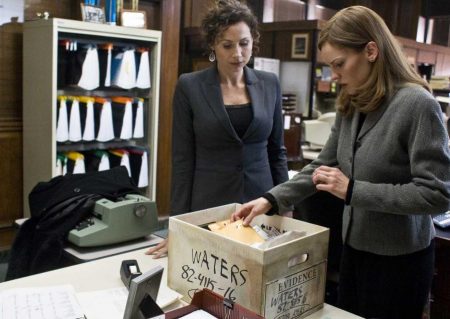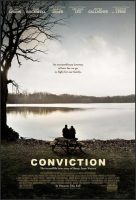Taglines: The incredible true story of Betty Anne Waters.
The story is about a single mother who worked her way through law school in order to free her brother, who was wrongfully convicted of murder. Swank will play the title role in the true story of a high school dropout who would not give up her belief that her brother, Kenneth, had been framed. In between raising kids and waiting tables, she worked her way through college and law school so she could represent her brother after he’d used up his attempts to appeal his conviction through public defenders.
The inspirational true story of a sister’s unwavering devotion to her brother. When Betty Anne Waters’ (two-time Academy Award winner Hilary Swank) older brother Kenny (Sam Rockwell) is arrested for murder and sentenced to life in 1983, Betty Anne, a Massachusetts wife and mother of two, dedicates her life to overturning the murder conviction.
Convinced that her brother is innocent, Betty Anne puts herself through high school, college and, finally, law school in an 18 year quest to free Kenny. With the help of best friend Abra Rice (Academy Award nominee Minnie Driver), Betty Anne pores through suspicious evidence mounted by small town cop Nancy Taylor (Academy Award nominee Melissa Leo), meticulously retracing the steps that led to Kenny’s arrest. Belief in her brother – and her quest for the truth – pushes Betty Anne and her team to uncover the facts and utilize DNA evidence with the hope of exonerating Kenny.
Conviction is a 2010 legal drama film directed by Tony Goldwyn, written by Pamela Gray, and starring Hilary Swank, Sam Rockwell, Thomas D. Mahard, Owen Campbell, Conor Donovan, Melissa Leo, Bailee Madison, Minnie Driver, Laurie Brown, Tobias Campbell, Frank Zieger and Marc Macaulay. The film premiered on September 11, 2010, at the Toronto International Film Festival and was released in the US on October 15, 2010.
Introduction
Those who heard Betty Anne and Kenneth’s story when it first made the news in the Spring of 2001 could not help but be moved by the unbreakable bond and steadfast refusal to give up that led to a man being saved against all the odds. Among those people was director Tony Goldwyn, whose wife saw the story on TV and urged him to investigate the incredible tale further. Goldwyn – acclaimed for his portrait of a woman and a nation on the cusp of change in A WALK ON THE MOON – immediately saw in the Betty Anne‘s battle something quintessentially cinematic, a story that would break the mold of the typical courtroom drama to become an emotional detective story about family loyalty and determination.
Says Goldwyn, “Betty Anne was a woman who gave up so much for her deep faith and belief in her brother, who could just as easily have been guilty. The questions for me were: What is that bond about? What is it that allows us to grasp onto impossible hope with those we love?”
These pivotal questions would lead Goldwyn on a nine-year journey of his own to capture Betty Anne’s dedication to Kenny on film. Goldwyn’s mission began with seeking the rights to the story, which had been acquired by New York-based filmmaker Andrew S. Karsch, who would come on board as the film‘s producer along with Andrew Sugerman.
Then Goldwyn dove into research, travelling to the Waters‘ home town in Rhode Island, researching who Betty Anne and Kenny really were and how they forged the bond that held them together through such an epic struggle. Although they were often separated in different foster homes as children, they always held onto their love for one another.
Goldwyn knew the basic facts of the case. In 1980, Massachusetts diner waitress Katharina Brow was found murdered in her trailer home, stabbed multiple times and robbed of $1,800 dollars. Early on, Kenny Waters, who lived near Brow and had a reputation as a troublesome kid, was questioned, and unequivocally said he was not involved. But two years later the confessions of two ex-girlfriends – who each claimed he admitted to the crime – helped to seal his conviction for murder, despite the lack of concrete evidence, and he received a life sentence without parole.
Yet Betty Anne never believed her brother was guilty, no matter what anyone – including a jury – might have said. Driven now to get him out of jail, and clear his name of the accusations that made no sense to her — yet with no money for high-priced lawyers — she made a daring leap for a woman with no job and two kids. She steadfastly continued her quest on the slim hope that if she could just get him an appeal and could just show the witnesses were coerced into lying, her brother might have a shot at freedom.
Goldwyn recalls, “I felt that Betty Anne‘s was the kind of story that people are hungry for right now — not about personal gain or naked ambition, but about one person acting purely out of commitment to another human being.”
Telling The Story
Tony Goldwyn returned to the Waters’ home a few weeks later with screenwriter Pamela Gray, with whom he had teamed so successfully on A WALK ON THE MOON. They spent a week there while Betty Anne filled in the blanks with stories of her and Kenny‘s life. She told them about the remarkable promise she made to her brother. ¯I said, ‘You promise that you’ll stay alive and I will go to law school,‘ recalls Betty Anne.
“It took a long time and Kenny got extremely depressed. But he always felt that somehow I would find a way. He had so much faith in me. I still can’t believe how much faith he had.” Goldwyn and Gray were rapt hearing Betty Anne recount her roller coaster journey, during which she never once thought of giving up. Says Gray, “Betty Anne is a great storyteller. She was so passionate and humble and you could see that what she did came from love. She pursued the impossible and no matter how many times she was afraid she would fail, she just kept going.”
“To some degree, I think we functioned as her therapist,” Goldwyn confesses. “We recorded everything she told us and then at night Pam and I would go back to the hotel and try to figure out how we were going to tell all of this truly incredible stuff that happened over a period of 40 years into one movie.” They began to hammer out a structure for the screenplay that turned the story into a kind of personal detective tale, weaving all the strands of the brother and sister‘s lives.
Gray also began to pore through the mountains and mountains of court transcripts, which she says were riveting. ¯There were people lying and in conflict and it was fascinating to piece together what happened in the courtroom with the stories Betty Anne shared with us, she says.
One of the biggest challenges in crafting the intricate structure of the screenplay, says Gray, was that there was simply too much material, some of which was hard to let go. “The true story had an incredible amount of suspense and drama to it, more than I ever could have imagined,” she says. “There were so many surprises and there was so much remarkable material for movie storytelling. The main questions were what to leave out and how to keep things moving forward in the most dramatic way.”
As she worked, the screenwriter felt a personal responsibility to both Waters siblings. “I wanted to really honor what Betty Anne had accomplished – and to honor the brother who lost nearly half his life to a terrible injustice,” she says.
At the same time, she didn‘t want to feel creatively hindered as she turned their multi-decade story into a taut two-hour screenplay. As with all true stories that become movies, Gray had to find the line between authenticity and strong storytelling.
“It was a process of taking the truth and then figuring out how to shape it dramatically with elements of fiction storytelling,” she explains. ¯Three themes are interwoven through everything: the theme of brother/sister love, the theme of a courageous woman up against impossible odds and the theme of a legal system that can sometimes be corrupt and destroy people.
When the script was finished, Academy Award winning actress Hilary Swank, who would ultimately join with a tight-knit ensemble cast in the role of Betty Anne, signed on as executive producer.
“We all wanted to tell this extraordinary story,” says Swank, “and it was a long time coming. I’ve always been drawn to true stories because life is stranger than fiction – and this story amazed, moved and inspired me. I was really stirred by the script and by this bond between a brother and sister.
“Tony was the magnet who attracted all the talent to this film and his passion for the project was unparalleled,” says producer Andrew S. Karsch.
Adds producer Andrew Sugerman, ¯Tony was all about the emotion and bringing out the essence of the humanity that’s in this story. He was very precise in the casting and every other element of the film — which allowed all that feeling to come through.
The storytelling may have come together beautifully but the rest of the process wasn’t quite as smooth. Goldwyn notes that the project hit the ground running “at a time when everything was falling apart.” He explains: “The Screen Actors Guild was threatening a strike, the whole business was going through a change, and studio productions had ground to a halt. But after a long process, we then we received a waiver from SAG to make this as an independent movie. It gave us the traction needed to make this film in a crazy time, and we just drove it through.”
He continues, “No matter how difficult it was to get the movie going, I stuck with it. I had a commitment to Betty Anne and I wasn‘t going to let it go. Ultimately, it really inspired me to see how we were able to put together cast and crew who were just as devoted to the story. It wasn‘t an ordinary job for any of us and it was really a blessing to be a part of that.
Conviction (2010)
Directed by: Tony Goldwyn
Starring by: Hilary Swank, Sam Rockwell, Thomas D. Mahard, Owen Campbell, Conor Donovan, Melissa Leo, Bailee Madison, Minnie Driver, Laurie Brown, Tobias Campbell, Frank Zieger, Marc Macaulay
Screenplay by: Pamela Gray
Production Design by: Mark Ricker
Cinematography by: Adriano Goldman
Film Editing by: Jay Cassidy
Costume Design by: Wendy Chuck
Set Decoration by: Rena DeAngelo
Art Direction by: Stephanie Gilliam
Music by: Paul Cantelon
MPAA Rating: R for language and some violent images.
Distributed by: Fox Searchlight Pictures
Release Date: October 15, 2010
